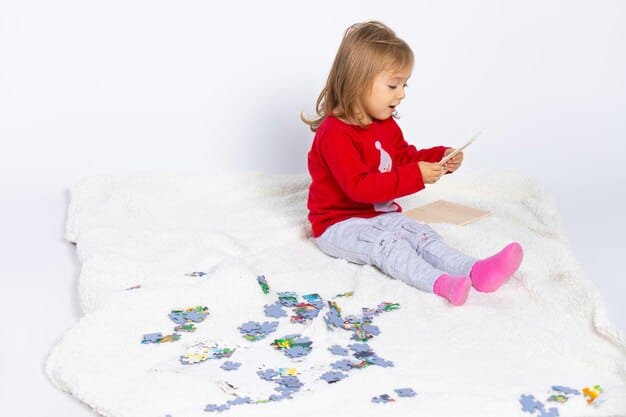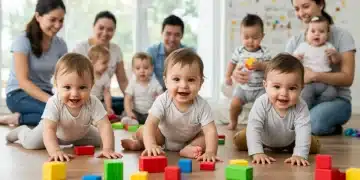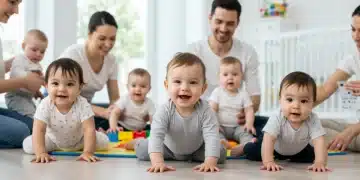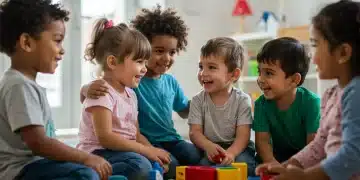Is Your Baby’s Development on Track? Key Milestones in the First Year

Tracking your baby’s development in the first year involves observing physical, cognitive, social, and emotional milestones such as rolling over, sitting up, babbling, and responding to their name, ensuring healthy growth and early intervention if needed.
Navigating the first year of your baby’s life is a journey filled with wonder and milestones. Are you wondering, ‘Is Your Baby’s Development on Track? Milestones to Watch for in the First Year?’ This guide will help you understand the key developmental markers and what to expect as your little one grows.
Understanding Baby Development Milestones
Understanding your baby’s developmental journey involves recognizing key milestones. These milestones are not strict deadlines but rather guidelines to help you gauge your child’s progress in various areas.
Let’s dive into what these milestones are and why they matter.
Why Milestones Matter
Developmental milestones are crucial indicators of a child’s growth and overall well-being. They help healthcare providers and parents identify potential developmental delays early on, allowing for timely intervention and support.
Tracking these milestones provides insights into your baby’s progress in different areas, such as physical, cognitive, social, and emotional development.
- Early detection of developmental delays.
- Opportunities for early intervention and support.
- Insights into your baby’s unique strengths and needs.

Physical Development: Gross Motor Skills
Gross motor skills involve the large muscles of the body and play a significant role in your baby’s physical development. These skills include movements like rolling over, sitting up, crawling, and eventually walking.
Understanding these milestones can help you support your baby’s physical growth effectively.
Key Milestones in Gross Motor Skills
From lifting their head to taking their first steps, babies achieve several gross motor milestones in their first year. Here’s a breakdown:
- 0-3 Months: Lifts head briefly while on tummy, moves arms and legs equally.
- 4-6 Months: Rolls over from tummy to back, sits with support.
- 7-9 Months: Sits without support, begins to crawl or scoot.
- 10-12 Months: Pulls to stand, cruises along furniture, may take first steps.
Fine Motor Skills: Hand and Finger Control
Fine motor skills involve the small muscles of the hands and fingers. These skills are essential for activities like grasping objects, transferring items from one hand to another, and eventually feeding themselves.
Watching your baby develop these skills is fascinating and rewarding.
Fine motor skills typically develop gradually throughout the first year, with newborns exhibiting reflexive grasping and older infants demonstrating more controlled and deliberate movements.
Here are tips to encourage development.
- Offer toys of different shapes and sizes.
- Encourage reaching and grasping activities.
- Provide safe opportunities for self-feeding.
Cognitive Development: Learning and Problem-Solving
Cognitive development refers to how your baby learns, thinks, and solves problems. This includes attention span, memory, and the ability to understand cause and effect.
Cognitive milestones are interconnected with other domains of development, such as language and social-emotional development.

Stages of Cognitive Development
From recognizing faces to understanding object permanence, babies achieve significant cognitive milestones.
- 0-3 Months: Pays attention to faces, follows moving objects with eyes.
- 4-6 Months: Reaches for objects, shows curiosity.
- 7-9 Months: Plays peek-a-boo, looks for hidden objects.
- 10-12 Months: Imitates gestures, understands simple instructions.
Language Development: Communication Skills
Language development involves how your baby understands and uses language. This includes babbling, understanding simple words, and eventually saying their first words.
Language milestones often build upon earlier achievements in other areas of development, such as cognitive and social-emotional development.
Here are some key language milestones to watch for:
- 0-3 Months: Coos and gurgles, responds to sounds.
- 4-6 Months: Babbles with consonant-vowel sounds (e.g., “ba,” “da”).
- 7-9 Months: Understands “no,” responds to name.
- 10-12 Months: Says “mama” and “dada,” understands simple commands.
Social and Emotional Development: Forming Connections
Social and emotional development involves how your baby interacts with others and expresses emotions. This includes smiling, making eye contact, and showing affection.
The development of social and emotional skills is impacted by various factors, including temperament, attachment experiences, and environmental factors.
Let’s review key social and emotional milestones.
- 0-3 Months: Smiles spontaneously, makes eye contact.
- 4-6 Months: Laughs, enjoys playing with others.
- 7-9 Months: Shows stranger anxiety, expresses different emotions.
- 10-12 Months: Waves bye-bye, imitates others.
When to Seek Professional Advice
While every baby develops at their own pace, it’s essential to be aware of potential signs of developmental delays. Early identification and intervention can make a significant difference in a child’s long-term development.
If you have concerns about your baby’s development, don’t hesitate to consult with a healthcare provider.
Seeking advice from a qualified professional can provide reassurance and guidance, even if there are no apparent issues.
Here are some red flags to consider:
- Not responding to sounds or voices.
- Difficulty with visual tracking.
- Lack of social smiling or interaction.
- Failure to reach for objects or grasp toys.
Monitoring your baby’s development involves tracking milestones and seeking professional advice when needed. Understanding what to expect and knowing when to intervene can set your child up for a healthy and happy start in life.
| Key Area | Brief Description |
|---|---|
| 🌱 Physical Growth | Rolling, sitting, crawling – developing motor skills. |
| 🧠 Cognitive Skills | Learning, problem-solving, and understanding the world. |
| 🗣️ Language Use | Babbling, understanding words, and saying first words. |
| ❤️ Social Interaction | Smiling, making eye contact, and forming attachments. |
Frequently Asked Questions
▼
Developmental milestones are a set of functional skills or age-specific tasks that most children can do within a certain age range. These milestones cover physical, cognitive, social, and emotional development.
▼
You can track your baby’s development by observing their behavior and skills, noting when they reach key milestones. Using a milestone checklist or app can also help you monitor their progress.
▼
If you’re concerned about your baby not meeting milestones, consult with their pediatrician or a developmental specialist. Early intervention can help address any potential delays and support your baby’s development.
▼
While milestones provide a general guideline, not all babies develop at the same pace. Variations are normal, but it’s essential to monitor progress and seek professional advice for any significant concerns.
▼
You can support your baby’s development by providing a stimulating environment, engaging in interactive play, reading to them, and offering plenty of love and attention. A healthy diet and regular check-ups are also crucial.
Conclusion
Monitoring your baby’s development throughout the first year is an enriching experience. By staying informed and attentive, you can ensure your little one is thriving and reaching their full potential. Celebrate each milestone, and remember to seek professional guidance whenever you have concerns.





